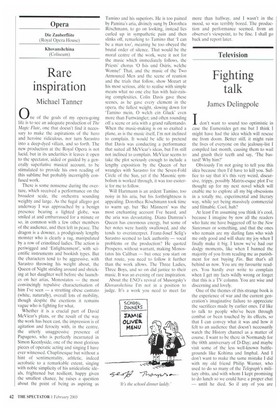Rare inspiration
Michael Tanner
One of the goals of my opera-going life is to see an adequate production of The Magic Flute, one that doesn't find it necessary to make the aspirations of the hero and heroine ridiculous, nor turn Sarastro into a deep-dyed villain, and so forth. The new production at the Royal Opera is not lucid, but in its unclarities it leaves it open to the spectator, aided or guided by a generally superlative musical account, to be stimulated to provide his own reading of this sublime but probably incorrigibly confused work.
There is some nonsense during the overture, which received a performance on the broadest scale, the orchestra sounding weighty and large. As the fugal allegro got underway I was approached by a benign presence bearing a lighted globe, was smiled at and embarrassed for a minute or so, in common with a few other members of the audience, and then left in peace. The dragon is a downer, a prodigiously lengthy monster who is clearly a rag, manipulated by a row of crinolined ladies. The action is periwigged and 'Enlightenment', with scientific instruments and bookish types. But the characters tend to be aggressive, with Sarastro throwing his weight about, the Queen of Night striding around and shrieking at her daughter well before she launches on her arias, Monostatos — the most convincingly repulsive characterisation of him I've seen — a strutting obese castrato (white, naturally), overall lots of mobility, though despite the exertions it remains vague who is fighting for what.
Whether it is a crucial part of David McVicar's plans, or the result of the way the work has been cast, the impression is of agitation and ferocity with, in the centre, the utterly unaggressive presence of Papageno, who is perfectly incarnated in Simon Keenlyside, one of the most glorious pieces of operatic acting and singing I have ever witnessed. Chaplinesque but without a hint of sentimentality, athletic, indeed acrobatic to a remarkable extent, singing with noble simplicity of his unidealistic ideals, frightened but resilient, happy given the smallest chance, he raises a question about the point of being as aspiring as Tamirio and his superiors. He is too pained by Pamina's aria, divinely sung by Dorothea Roschmann, to go on looking, instead lies curled up in sympathetic pain and then slinks off, remarking to Tamino that I can be a man too', meaning he too obeyed the brutal order of silence. That would be the moral centre of the work, were it not for the music which immediately follows, the Priests' chorus '0 Isis und Osiris, welche Wormer That, and the music of the Two Armoured Men and the scene of reunion and the trials that follow, show Mozart at his most serious, able to realise with simple means what no one else has with hair-raising complexities. Colin Davis gave these scenes, as he gave every element in the opera, the fullest weight, slowing down for `Tarnino mein. 0 welch em n Gluck' even more than Furtwangler; and often rounding off a scene or aria with a grand rallentando. When the music-making is on so exalted a plane, as is the music itself, I'm not inclined to complain. It would be idle to pretend that Davis was conducting a performance that suited all McVicar's ideas, but I'm still not inclined to complain. McVicar seems to take the plot seriously enough to include a lengthy exposition by the Queen of her wrangles with Sarastro for the Seven-Fold Circle of the Sun, yet if the Masonic symbolism is worked through, it was too esoteric for me to follow.
Will Hartmann is an ardent Tamino, too noisy in his aria, but his forthrightness is appealing. Dorothea Raschmann took time to warm up, but 'Bei Mannern' was the most enchanting account I've heard, and the aria was devastating. Diana Damrau's Queen has enormous energy, but some of her notes were hastily swallowed, and she tends to overinterpret. Franz-Josef Selig's Sarastro seemed to lack authority — vocal problems or the production? He quoted Prospero, without warrant, making Monostatos his Caliban — but once you start on that route, you need to follow it further than the work allows. The Three Ladies, Three Boys, and so on did justice to their music. It was an evening of rare inspiration.
About the ENO's revival of Musorgsky's Khovanshchina I'm not in a position to judge. It's a work you need to meet far
more than halfway, and I wasn't in the mood, so was terribly bored. The production and performance seemed, from an observer's viewpoint, to be fine. I shall go back and report later.


























































 Previous page
Previous page